UNB researcher part of climate change report released at UN Climate Action Summit
Author: UNB Newsroom
Posted on Sep 24, 2019
Category: UNB Saint John

Dr. Thierry Chopin, a professor of marine biology at UNB, is one of 19 international researchers and policy analysts who prepared a groundbreaking report for the United Nations Climate Action Summit in New York.
The report, “The Ocean as a Solution to Climate Change: Five Opportunities for Action,” was written for the High Level Panel for a Sustainable Ocean Economy (HLPSOE), a unique group of 14 current heads of state and government.
Their work is the first ever comprehensive, quantitative analysis into the role that ocean-based solutions can play in the fight against climate change. While the ocean is being threatened by climate change, the researchers flipped the approach to ask if the ocean could, in fact, be a solution for climate change.
“We identified five opportunities for action that could help turn the tide against climate breakdown,” says Dr. Chopin. “We highlight solutions that would help curb climate change and contribute to the development of a sustainable ocean economy, while protecting coastal communities from increasingly severe storms, safeguarding and creating jobs, improving food security, reducing air pollution, restoring habitats for wildlife and helping maintain economic growth, thereby helping to meet the objectives of the Paris Agreement and the Sustainable Development Goals of the United Nations.”
The five solutions are: investing in nature-based climate solutions; harnessing ocean-based renewable energy; decarbonizing ocean industries; securing sustainable food for the future from the ocean; and advancing the deployment of carbon capture and storage.
According to the report, these five actions could deliver up to a fifth of the annual greenhouse gas emissions cuts needed by 2050 to keep global temperature rises below 1.5°C.
“The ocean can play a significant role in narrowing the global emission gap that lies between a pathway based on ‘current policy’ and the desired pathway that would hold global warming to 1.5°C above preindustrial levels,” says Dr. Chopin. “If the world pursues the less ambitious target of 2.0°C, ocean-based interventions could close up to 25 percent of the emission gap by 2050.”
Taking ocean-based action in tandem with efforts to decarbonize land-based industries, including phasing out fossil fuels and restoring and protecting forests, will fast-track emissions cuts and protect ocean health, according to the report.
Many of the mitigation options presented in the report can be implemented now, with technologies already available, to accelerate many ocean-based climate actions immediately. The governments represented on the HLPSOE are already coming forward with early action and new ocean-climate commitments.
“The report documents the ocean’s untapped potential to fight climate change. It shows that the ocean, and its coastal regions, holds a key to their own survival, and, in fact, ours. It is up to humanity to seize this potential, and act very soon,” says Dr. Chopin.
“For far too long the ocean has been mostly absent from serious policy discussions about reducing carbon emissions,” writes Dr. Jane Lubchenco, co-chair of the expert group. “Now, thanks to a new scientific analysis conducted for the HLPSOE, and with HLPSOE member countries and industries poised to act, the ocean is squarely on the climate mitigation agenda. Ocean-based actions provide hope that reaching the Paris Agreement target of 1.5°C might be possible.”
Media contact: Kelsey Pye
Photo: Dr. Thierry Chopin with two of the seaweed species he is cultivating in the Bay of Fundy, in collaboration with Magellan Aqua Farms Inc., and in that way participating in ocean-based climate action 1 (investing in nature-based climate solutions) and 4 (securing sustainable food for the future from the ocean). Credit: Steven Backman
